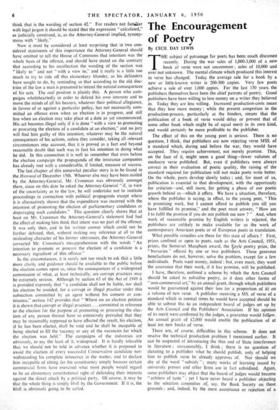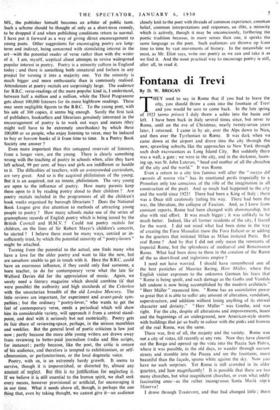The Encouragement
of Poetry
By CECIL DAY LEWIS
THE subject of patronage for poets has been much discussed recently. During the war sales of 1,000-3,000 of a new book of verse were not uncommon ; sales of 10,000 and over not unknown. The mental climate which produced this interest in verse has changed. Today the average sale for a book by a
new or little-known writer is 200-300 copies. Very few poets achieve a sale of over 1,000 cppies. For the last 150 years the publishers themselves have been the chief patrons of poetry. Good publishers have been willing to lose money on a writer they believed in. Today they are less willing. Increased production-costs mean that they lose more money ; while the present congestion in the production-process, particularly at the binders, Means that the publication of a book of verse would delay or prevent that of some other book which might be of equal merit in its own kind, and would certainly be more profitable to the publisher.
The effect of this on the young poet is serious. There is no question, I think, that publishers are now rejecting verse MSS. of a standard which, during and before the war, they would have accepted. They require achievement, not merely promise. This, on the face of it, might seem a good thing—fewer volumes of mediocre verse published. But, even if publishers were always correct in their evaluation of poetic quality, the raising of the standard required for publication will not make poets write better. On the whole, poets develop slowly today ; and, for most of us, publication is essential to that development, with the opportunity for criticism—and, still more, for getting a phase of our poetic growth behind us—which it offers. We have a situation, therefore, where the publisher is saying, in effect, to the young poet, " This is promising work, but I cannot afford to publish you till you have fulfilled its promise," and the poet must answer, " How am Ito fulfil the promise if you do not publish me now ? " And, when work of reasonable promise by English writers is rejected, the publishers are unlikely to make available for us the work of contemporary American poets or of European poets in translation.
What possible remedies are there for this state of affairs ? First, prizes confined or open to poets, such as the Arts Council, 1951, prizes, the Somerset Maugham award, the Doyle poetry prize, the " bursaries " offered by one or two publishers. These generous benefactions do not, however, solve the problem, except for a few individuals. Poets want money, indeed ; but, even more, they want the assurance that their work, if it has promise, will be published.
I have, therefore, outlined a scheme by which the Arts Council should be asked to subsidise poetry, as it does other forms of " non-commercial art," by an annual grant, through which publishers would be guaranteed against their loss (or a proportion of it) on a volume of new verse. A publisher receiving a MS. of verse of a standard which in normal times he would have accepted should be able to submit this to an independent board of judges set up by the Arts Council and the Publishers' Association. If his opinion of its merit were confirmed by the judges, a guarantee would follow. An annual grant of £2,000 would enable the publication of at least ten new books of verse.
There are," of course, difficulties in this scheme. It does not resolve the technical production problem I mentioned earlier. It can be suspected of introducing the thin end of State interference in literature ; unreasonably, I think ; there is no question of dictating to a publisher what he should publish, only of helping him to publish verse he already approves of. Nor should we shy at the word " subsidy " ; many works of learning. issued by university presses and other firms are in fact subsidised. Again, some publishers may object that the board of judges would become " arbiters of taste " ; yet I have never heard a publisher objecting to the selection committee of, say, the Book Society on these grounds ; and, indeed, by the mere acceptance or rejection of a
MS., the publisher himself becomes an arbiter of public taste. Such a scheme should be thought of only as a short-term remedy, to be dropped if and when publishing conditions return to normal. I have put it forward as a way of giving direct encouragement to young poets. Other suggestions for encouraging poetry are long- term and indirect, being concerned with stimulating interest in the art—with the potential reader of verse rather than with the writer of it. I am, myself, sceptical about attempts to revive widespread popular interest in poetry. Poetry is a minority culture in England today ; and there is something both unnatural and forlorn in any project for turning it into a majority one. Yet the minority is much bigger and more enthusiastic than is commonly realised. Attendances at poetry recitals are surprisingly large. The audience for B.B.C. verse-readings of the more popular kind is, I understand, between half a million and a million, while the Third Programme gets about 100,000 listeners for its more highbrow readings. These may seem negligible figures to the B.B.C. To the young poet, with his sale of 300 copies, it seems big enough. Surely the first task of publishers, booksellers and librarians genuinely interested in the encouragement of poetry is to work out ways and means (they might well have to be extremely unorthodox) by which these 100,000 or so people, who enjoy listening to verse, may be induced to buy or borrow books of it from time to time. Is a Poetry Book Society one answer ?
Even more important than this untapped reservoir of listeners, from a longer view, are the young. There is clearly something wrong with the teaching of poetry in schools when, after they have left school, 99 per cent. of boys and girls are indifferent or hostile to it. The difficulties of teachers, with an overcrowded curriculum, are very great. And so is the acquired philistinism of the young. But it is an acquired, not an innate, philistinism. The very young are open to the influence of poetry. How many parents keep them open to it by reading poetry aloud to their children ? Are poetry recitals included in the programmes of all the children's book weeks organised by borough librarians ? Does the National Book League give due attention to methods of attracting young people to poetry ? How many schools make use of the series of gramophone records of English poetry which is being issued by the British Council and H.M.V. ? Could not poetry recitals for children, on the lines of Sir Robert Mayer's children's concerts, be started ? I believe there must be many ways, untried or in- sufficiently tried, by which the potential minority of " poetry-lovers " might be attached.
Turning from the potential to the actual, one finds many who have a love for the older poetry and want to like the new, but are somehow unable to get in touch with it. Here the B.B.C. could have an enormous influence, if they could only find someone, a born teacher, to do for contemporary verse what the late Sir Walford Davies did for the appreciation of music. Again, we sorely need a literary magazine which should combine (if that were possible) the authority and high standards of the Criterion with the unsectarian breadth of the old London Mercury. The little reviews are important, for experiment and avant-garde sym- pathies ; but the ordinary " poetry-lover," who wants to get the feel of contemporary verse, needs a periodical which will show him its considerable variety, will approach it from a central stand- point, and deal with it seriously but not esoterically. Poetry gets its fair share of reviewing-space, perhaps, in the serious monthlies and weeklies. But the general level of poetic criticism is low just now ; partly because the more able young writers are drawn away from reviewing to better-paid journalism (radio and film scripts, for instance) ; partly because, like the poet, the critic is unsure of his audience, and therefore is tempted to exhibitionism, or self- communion, or perfunctoriness, or the loud dogmatic voice.
Poetry, with us, is an extremely hardy growth. It seems to survive, though it is impoverished, or distorted by, almost any amount of neglect. But this is no justification for neglecting it. If we believe it is still essential to the human spirit, we shall seek every means, however provisional or artificial, for encouraging it in our time. What it needs above all, though, is perhaps the one thing that, even by taking thought, we cannot give it—an audience
closely knit to the poet with threads of common experience, common belief, common interpretations and responses, an elite, a minority which is actively, though it may be unconsciously, furthering the poetic tradition because, in more senses than one, it speaks the same language as the poet. Such audiences are thrown up from time to time by vast movements of history. In the meanwhile we must, as Mr. Eliot says, write our poetry as we can and take it as we find it. And the most practical way to encourage poetry is still, after all, to read it.







































 Previous page
Previous page